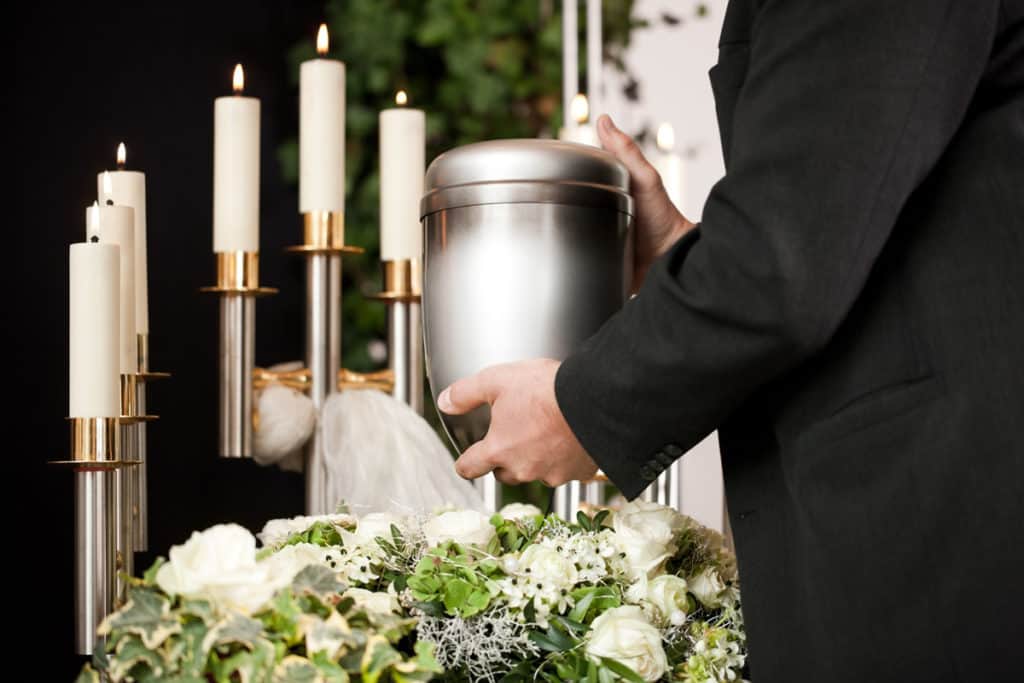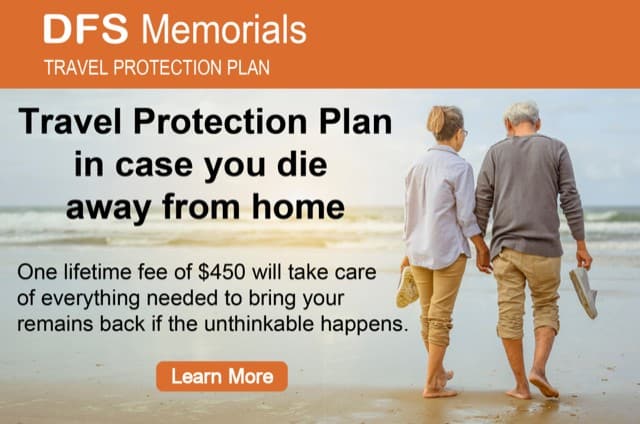Arranging a funeral or cremation in Vermont
Arranging a funeral or cremation can be a difficult task, especially when you are feeling emotionally vulnerable and this can make all the decisions that have to be made seem very overwhelming. This guide to arranging a funeral or cremation in Vermont aims to provide a starting point and give you an overview of some of the main things you need to consider. Being better informed of the laws guiding funeral homes, the costs you can expect and what options you have, can make beginning the process a little easier.
Choosing a funeral home in Vermont
One of the first things you will need to do, especially if a death has just occurred, is choose the funeral director you wish to handle the funeral services.
There are in the region of 70 funeral homes and mortuaries in Vermont so you need to consider what criteria can help you select the right funeral home for your needs. Do you require a traditional funeral or burial service? Or are you seeking a more contemporary life celebration service, or a cremation? Is the cost of the funeral an issue, are you working to a tight budget and looking to save money where you can on funeral expenses? Having some clear ideas of what you do need from a funeral home can help you make the decision of which funeral home is right for you.
Many people seek recommendations of referrals from family or friends, and this is a very good way to get information. However, if you are not in a position to benefit from a sound referral, or you are seeking something specific, you may have to resort to contacting funeral homes yourself. Generally, people look for a reputable funeral business in their own area, but it is always advisable to check with more than one funeral home and compare services and prices for a funeral or cremation.
All funeral establishments and professionals are licensed by the State Board of Funeral Service in Vermont. If you have any questions about the professional registration or conduct of a funeral director you can contact the Board on (802) 828-1501.

What does an average funeral cost in Vermont?
The average cost of a funeral in the U.S. is $7,848 (according to the NFDA – National Association of Funeral Directors 2021), and this does not include any cemetery fees. Once you add in cemetery fees, your total cost could be in the region of $10,000+. The cost for a traditional burial is largely dependent on the type of casket you select and the final cost of your cemetery plot and grave marker. Some funeral homes do offer more economical funeral services, and if you shop around you should be able to arrange simple funeral services for between $3,500 to $6,000.
All funeral homes in Vermont must have a general price list (GPL) that outlines their service charges and funeral merchandise prices. They must provide a copy of their GPL when they quote you a price according to the Federal Trade Commission’s ‘Funeral Rule’.
It is strongly recommended that you DO compare like-for-like, and shop around and compare funeral prices between more than one funeral home. Prices can, and do, vary quite considerably even for the exact same service!
How much does a cremation cost in Vermont?
A typical cremation funeral service will cost in the region of $3,900 (depending upon the ancillary services/products you select). This is the type of cremation service that replaces a full traditional funeral. It is possible to arrange a cremation for considerably less than this.
Arranging a direct cremation in Vermont
A direct cremation can be arranged in Vermont for around $1,395. This is the least expensive cremation option for families. A direct cremation means that there are no services, the cremation goes ahead once all the documentation has been completed and then the cremated remains are returned to the family in a temporary container. Incremental options, such as a private family viewing or an upgraded cremation urn, can be added to a basic direct cremation package for an additional fee.
If you are concerned about funeral costs, the DFS Memorials providers in Vermont offer low cost cremation services and affordable burial services. All DFS Memorials providers guarantee to offer a ‘best value’ direct cremation package.
How do I decide between a burial or a cremation in Vermont?
The decision of choosing between burial or cremation is very much a personal choice. The deceased may have left explicit wishes or surviving family may have to make a decision. Faith and/or funds for the funeral service can play a significant role in whether a burial or cremation is chosen. Having a pre-existing cemetery plot can be an important aspect as burial plots can be quite expensive to purchase these days. Cremation is certainly on the increase in the United States, and is becoming a popular funeral alternative for many now. Green burials are also another option that can be considered.
If you are unsure whether to choose between burial or cremation, talk to family and friends, and discuss the decision with your funeral director.
Know your rights – funeral laws in Vermont
Each state has its own legislature that licenses funeral establishments and funeral professionals. Although many of these laws are universal, some laws do vary by state, so it is important to know what these are. You do not have to use the services of a funeral director in Vermont to conduct death care. You can, if you so choose, look after the deceased yourself. There are only 8 states that require you to legally employ a funeral director and Vermont is not one of them.
What do I need to understand about laws and permits for cremation in Vermont?
In order for a cremation to be performed, the legal next of kin must sign a ‘Cremation Authorization Form’ and a cremation permit must be issued. A cremation cannot proceed until these documents have been duly completed, signed and notarized. No casket is required by law for a cremation but a suitable rigid cremation container is required. This can be a simple cardboard container. If a service is to be held before the cremation, some funeral homes will offer rental caskets that you can use for the service before the cremation is conducted using a simple cremation container.
What can we do with the cremated remains? Laws for scattering cremation ashes in Vermont.
As cremation is becoming increasingly popular in Vermont, so more families are considering different options for memorialization. Cremation offers greater flexibility, not only in that immediate interment is not required, but also that there is a whole array of cremation artefacts that can be made.
We are often asked about the legal aspects of how and where families can scatter cremation remains. The answer is that when it comes to scattering this is not highly regulated area. Human cremated remains are basically sterile, organic matter and really pose no threat to the environment, however, safe scattering techniques should be employed. Scattering should only be conducted on private land with the landowner’s consent and you should always check with any ordnance if you are considering scattering in parklands or public areas. Common-sense guidelines should be followed and respect for the fact that you are dispersing mortal remains. Visit our ash-scattering guide for more information.
The Environmental Protection Agency (EPA) governs the scattering of cremains at sea. Remains can be scattered 3 nautical miles to sea and a written notification of the disposition should be made to the local EPA coordinator within 30-days. Vermont is in Region 1 of the divisional EPA areas and the regional office is at: 1 Congress St, Boston, MA 02114-2023 Phone: (617) 918-1538. There are no Vermont statutes specifically forbidding the scattering of cremated remains in Lake Champlain or other public places. But you should bear in mind that cremated remains are usually quite white and conspicuous and you should use discretion when scattering them, and scatter them widely enough that they’re not noticeable.

Does the deceased have to be embalmed?
There is no legal requirement, or state law, stipulating that you have to have the deceased embalmed. However, some funeral homes may adopt policies that insist upon embalming if a public viewing or service is being held with the deceased in repose. If you proceed with a timely funeral, there is really no need for embalming (and it can just be another fee to add to your funeral costs!)
Purchasing a casket or grave marker in Vermont
We have comprehensive guides to buying a casket or grave marker on US Funerals Online, so I would recommend you visit these sections for more detailed information about purchasing a casket or how to order an affordable headstone online.
Can I pre-plan a funeral in Vermont?
Yes, you certainly can, and this is becoming a preferred choice for many families in Vermont now. Pre-planning your funeral alleviates family of both the difficult decisions and the financial burden of funeral expenses. You can make pre-need funeral arrangements direct with a funeral home or purchase burial insurance.
What you DO need to consider is that funeral prices could indeed be coming down. Funeral companies promote preplanning on the basis that it “locks into today’s prices”, but with the cremation trend increasing, and more funeral homes competing for the ‘affordable’ funeral market – the reality is that the funeral costs are not as ‘fixed’ as they once were.
Another funeral planning alternative is to document your wishes and put aside the appropriate funds in a POD Payable on Death account or a Totten Trust. This enables family to access the funds at the time of need and make the funeral arrangements, but you keep in control of your monies and any accrued interest. Read more in our article ‘What is my best and safest option for putting aside money for a funeral’.
You should also consider that membership of a Cremation Society does not necessarily save you on cremation costs. Many cremation societies, such as the Cremation Society of Vermont, offer customers a discounted cremation service package if they join the society and pay a nominal membership fee. However, the reality is that in many cases a cremation society will indeed waiver their non-member service charge if you approach them at the time of need.
Who is responsible for paying for the funeral?
The deceased must have made provision for their death care arrangements, either with a preneed funeral policy, a life insurance policy or a POD Trust, or the next of kin will be liable to cover the funeral expenses if the deceased left no provision.

Can I donate my body to science in Vermont?
Yes, donating your body to science can be a great way to facilitate your end-of-life needs and, apart from being a gift to society, can also mean that you do not have any funeral expenses. Most of the national organizations that deal with full body donation handle everything from the moment you notify them of the death, including collecting the body, the donation, the free cremation and the return of the cremated remains to the family a few weeks later. More people are choosing body donation now, and once they have had the cremated remains returned to them at no-cost, they then arrange their own memorial service for the family. Check out our Body Donation section.
How can I transport a loved one either back to, or from, Vermont after death?
If a loved one needs to be transported back to a state or country of origin following their death in Vermont (or dies overseas), you will need the services of a funeral director who can arrange funeral shipping for you. This generally needs a funeral professional who can coordinate arrangements at the place of death and wherever the body is being shipped to.
If transporting a loved one between states in the United States you have the option of flying the body, or transporting the body by land. Certain regulations do apply on moving a body, and it is likely that embalming will be required as well as specific containers to hold the casket. Shipping a body can be quite expensive, so the other alternative you have is to have the body cremated at the place of death, and then transport back the cremated remains. Visit our section on Funeral Shipping to read more.
If you do travel regularly for work, pleasure, sport, visiting family, or snow-birding, you may wish to consider our great value Travel Protection Plan. This plan costs just $450 for an individual for lifetime protection against the costly expense of returning a body home if a death occurs 75 miles (or further) from your residence. It also provides global coverage. Domestic funeral shipping can cost from $3,000, and International repatriation can start at around $6,900.
How do I obtain a certified death certificate in Vermont?
The funeral director generally obtains the original death certificate on your behalf. Once it has been signed by the attending physician or Medical Examiner, the funeral director will ensure it is filed with the Bureau of Vital Records in Burlington. It generally takes about 3 to 5 days for it to be officially notated and filed. Certified copies of the death certificate can then be issued by Vermont Department of Health and certified copies cost $10.00 each. It is advisable to have more than one copy of the death certificate as you will need to submit certified copies to institutions and government agencies to close down the deceased’s estate.
Who should I contact if I have a complaint about a funeral home in Vermont?
Hopefully you will find the services of your funeral home more than adequate, as most funeral professionals are very dedicated in their vocation. Unfortunately though, it does sometimes happen that you may have a complaint or grievance with a funeral home and you do not manage to resolve it directly with the funeral director. In this case you should make your complaint in writing to the Vermont Board of Funeral Service, Secretary of State at 128 State Street, Montpelier, Vermont 05633.
We hope this guide has helped to answer some of your immediate questions. Please check out our Library/Info section for our full catalogue of resources to help you through the process of arranging a funeral. Feel free to contact us if we can be of any assistance with any further questions you may have.
Resources:


